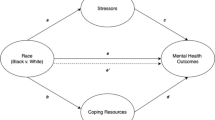Abstract
Some scholars have suggested that stressful living conditions are a major source of mental disorder among African Americans (Krieger, 1999; Neighbors, 1990; Kessler & Neighbors, 1986). There has, however, been debate as to whether this higher level of distress is due to racism or the fact that African Americans are more often of lower socioeconomic status. Stressors that play a significant role in mental disorder might be expected to occur more frequently among African Americans than the general population. This paper attempts to provide empirical support for the notion that racism is a separate and unique source of stress for African Americans. Specifically, it was hypothesized that African Americans would report more experiences of (1) daily stress and (2) racism than other groups and (3) the impact of racial stress would be greater among African Americans. One hundred and fifty six participants completed the Daily Stress Inventory and the Experience of Discrimination questionnaire. Multivariate analysis of variance indicated that African Americans reported higher impact of discrimination scores than European Americans. There were no gender or ethnicity differences in daily stress or the number of racial incidents reported. The implications of the data are discussed.
Similar content being viewed by others
REFERENCES
Abbott, A. A. (1995). Repetitive life patterns and coping with the crisis of unemployment. In A. R. Robbers (ed.), Crisis Intervention and Time Limited Cognitive Treatment (pp. 188–214). New York: Sage.
Beck, A., Ward, C., Mendelson, M., Mock, J., Erbaugh, J. (1961). An inventory for measuring depression. Archives of General Psychiatry, 4, 561–571.
Brantley, P. J. & Jones, G. N. (1989). Daily Stress Inventory: Professional Manual. Odessa, FL: Psychological assessment Resources, Inc.
Canadian Council of Christians and Jews (1993). 1993 CCC survey highlights. http://www.interlog. com/_cccj/survey/1993/highlights.html#existence.
CNN Interactive (1997). Housing discrimination claims surge. http://cnn.com/US/9705/21/briefs. pm/housing/.
Fernando, S. (1988). Race and Culture in Psychiatry. London: Croom Helm.
Government Executive Magazine (1997). Bias claims on the rise. http://www.govexec.com/dailyfed/ 0997/091797a2.htm.
Griffin, J. T. (1991). Racism and humiliation in the African American community. The Journal of Primary Prevention, 12, 149–167.
Hacker, A. (1992). Two nations: Black, and White, separate, hostile, unequal. New York: Scribner.
Horowitz, M. J., Wilner, N. & Alvarez, W. (1979). Impact of events scale: A measure of subjective stress. Psychomatic Medicine, 41, 209–218.
Janof-Bulman, J. (1989). Assumptive worlds and the stress of traumatic events: Applications of the schema construct. Social Cognition, 7, 113–136.
Kessler, R. C. & Neighbors, H. W. (1986). A new perspective on the relationships among race, social class and psychological distress. Journal of Health and Social Behavior27, 107–115.
Klonoff, E. A., Landrine, H., & Ullman, J. B. (1999). Racial discrimination and psychiatric symptoms among Blacks. Cultural Diversity and Ethnic Minority Psychology, 5, 329–339.
Krieger, N. (1999). Embodying inequality:Areview of concepts, measures, and methods for studying health consequences of discrimination. International Journal of Health Services, 29, 295–352.
Landrine, H. & Klonoff, E. A. (1996). The schedule of racist events: A measure of racial discrimination and a study of its negative physical and mental health consequences. The Journal of Black Psychology, 22, 144–168.
Lazarus, R. S. (1984). Puzzles in the study of daily hassles. Journal of Behavioral Medicine, 7, 375–384.
Miller, F. S. (1992). Network structure support: Its relationship to the psycho-social development of black females. In G. Powell (Ed.), The psycho-social development of minority group children (pp. 275–306). New York: Brunner/Mazel.
Moos, R. H. (1993). Coping Responses Inventory—Adult Form Professional Manual. Odessa, FL. Psychological Assessment Resources, Inc.
National Center for Victims of Crime. (1998). Statistics: Hate Crime. http://www.ncvc.org/stat/ hc.htm.
Neighbors, H. W. (1984). The distribution of psychiatric morbidity in Black Americans. Community Mental Health Journal, 20, 169–181.
Neighbors, H. W. (1990). The prevention of psychopathology in African Americans: An epidemiological Perspective. Community Mental Health Journal, 26, 167–178.
Pierce, C. M. (1995). Stress analogs of racism and sexism: Terrorism, torture, and disaster. In C. V. Willie, P. P. Reiker, B. M. Kramer, & B. S. Brown (Eds.), Mental health, racism and sexism (pp. 277–293). Pittsburgh: University of Pittsburgh Press.
Plummer, D. L. & Slane, S. (1996). Patterns of coping racially stressful situations. The Journal of Black Psychology, 22, 302–315.
Rabkin, J. G. & Struening, E. L. (1976). Life events, stress, and illness. Science, 194, 1013–1020.
Thompson Sanders, V. L. (1990). Factors affecting the level of African American identification. Journal of Black Psychology, 17, 19–35.
Thompson Sanders, V. L. (1995). Sociocultural influences on African American racial identification. Journal of Applied Social Psychology, 25, 141–1429.
Thompson Sanders, V. L. (1996). Perceived experiences of racism as stressful life events. Community Mental Health Journal, 32, 223–233.
United States Department of Commerce. (1990). Census of population and housing census tracts, standard metropolitan statistical area.Washington, D. C.: US Government Printing Office.
Utsey, S. O. (1998). Assessing the stressful effects of racism: A review of instrumentation. Journal of Black Psychology, 24, 269–288.
Yinger, J. (1995). Closed doors, opportunities lost: The cost of housing discrimination. New York: Sage.
Author information
Authors and Affiliations
Rights and permissions
About this article
Cite this article
Thompson, V.L.S. Racism: Perceptions of Distress Among African Americans. Community Ment Health J 38, 111–118 (2002). https://doi.org/10.1023/A:1014539003562
Issue Date:
DOI: https://doi.org/10.1023/A:1014539003562



